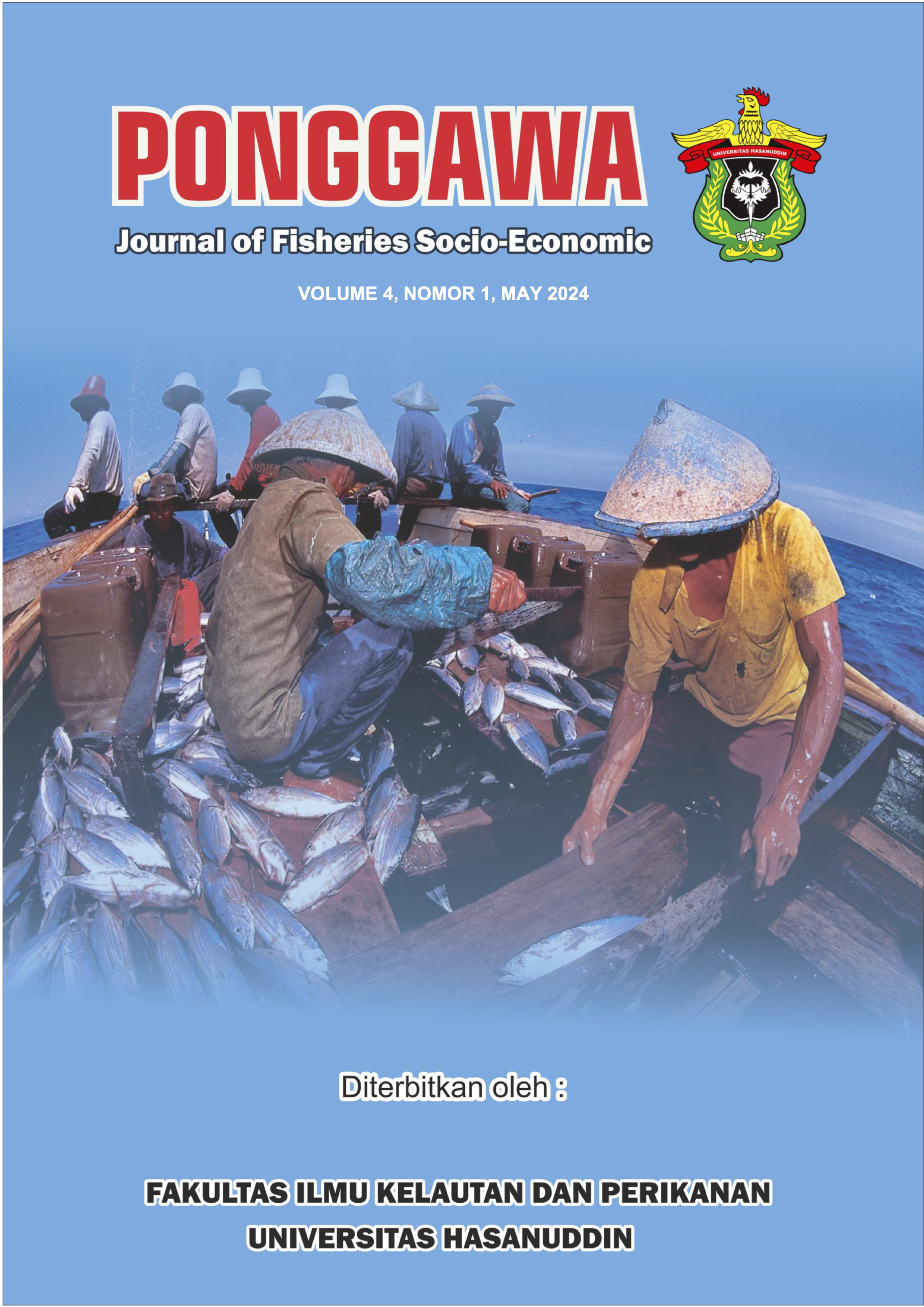The Amount of Fish Consumption of Vulnerable People Tamannyeleng Village, Barombong District, Gowa Regency
DOI:
https://doi.org/10.35911/ponggawa.v4i1.19810Keywords:
Fish, Fish consumption, Susceptible, Covid-19Abstract
The purpose of this study was to determine the number and factors that influence fish consumption in Tamannyeleng Village, Barombong District, Gowa Regency. This research was conducted from June to July 2021 in Tamannyeleng Village, Barombong District, Gowa Regency. The type of research used is a type of survey, which is research that takes samples from a population in the field and is used as basic data. The sampling technique used is non probability sampling. The technique of non-probability sampling is that each member of the population has zero chance. That is, sampling is based on certain criteria such as judgment, status, quantity, voluntariness and so on. The results of the study obtained were the amount of fish consumption before Covid-19 and after Covid-19 there was a difference. Before the existence of COVID-19, there were several who consumed fish as much as 0.5 kg per week, 1 kg per week, 2 kg per week and there were respondents who no longer consumed fish per week during Covid-19. It can be seen that the people of Tamannyeleng Village feel that during this Covid-19 period they are experiencing difficulties. Meanwhile, the factors that affect fish consumption of vulnerable people in Tamannyeleng Village, Barombong District, Gowa Regency consist of income, education, taste, number of family members, fish prices and fish substitution prices.
References
Ernawati, Peni. 2017. Analisis Tingkat Konsumsi Ikan Pada Masyarakat Kawasan Minapolitan,Kecamatan Wajak, Kabupaten Malang, Jawa Timur. Skripsi. Program Studi Agrobisnis Perikanan Jurusan Sosial Ekonomi Perikanan Dan Kelautan. Universitas Brawijaya : Malang
Kadji, Yulianto. 2010. Kemiskinan dan Konsep Teoritisnya. Fakultas Ekonomi dan Bisnis UNG.
Nanlohy, Hellen dkk. 2014. Analisis Persepsi Masyarakat Terhadap Pengelolaan KawasanMangrove Teluk Kotania. Jurnal Wilayah dan Lingkungan. Manajemen SumberDaya Pantai. Universitas Diponegoro : Semarang
Oktavianti, Henny DKK. 2017. Perilaku Konsumsi Rumah Tangga Dan Pengaruhnya TerhadapKebijakan Makro Ekonomi Kabupaten Bangkalan. Jurnal. Program Studi Ekonomi Pembangunan. Universitas Trunojoyo : Madura
Pinaryo. 2014. Persepsi Mahasiswa Universitas Muhammadiyah Ponogoro Terhadap ProgramKewirausahaan Mahasiswa. Fakultas Ilmu Sosial dan Politik. Universitas Muhammadiyah Ponogoro.
Prawoto, Nano. 2009. Memahami Kemiskinan Dan Strategi Penanggulangannya. Fakultas Ekonomi Universitas Muhammadiyah Yogyakarta: Yogyakarta
Rizakiyah, Harisatur. 2017. Perilaku Konsumen Ibu Rumah Tangga Desa Joho 07, Sleman, Yogyakarta. Universitas Negeri Yogyakarta. Yogyakarta
Simanjuntak, Christina. 2016. Hubungan Konsumsi Ikan Dengan Tingkat Kecukupan Protein Anak Balita Pada Keluarga Nelayan Di Keluarga Pasir Bidang Kecamatan Sarudik Kabupaten Tapanuli Tengah. Fakultas Kesehatan Masyarakat Universitas Sumatera Utara Medan. Medan
Yuliana. 2020. Corona virus disease (Covid-19). Jurnal. Vol 2 Nmr 1. Fakultas Kedokteran Universitas Lampung. Lampung
Zelda Siahaan, Betty. Pengaruh Kemampuan Kinerja, Persepsi Peran dan Motivasi KerjaTerhadap Kinerja Pegawai Administrasi Universitas Negeri Jakarta. Jurnal. JurusanFisika FMIPA Universitas Negeri Jakarta : Jakarta








